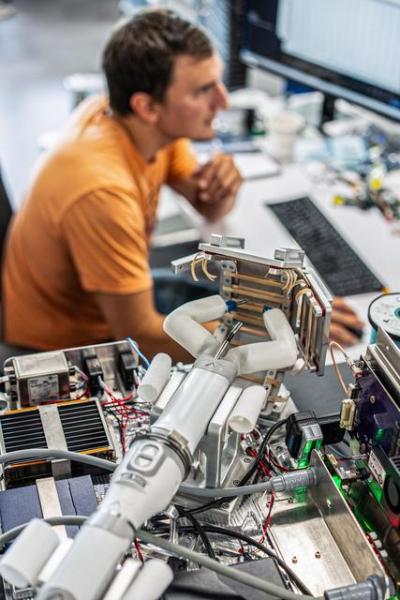In a giant leap for medtech-kind, a robotic surgery system is now en route to the International Space Station (ISS).
The system in question is a version of Virtual Incision’s MIRA robot, modified for use in an outer space environment. The MIRA technology is smaller than many other robotic surgery systems—weighing in around 1,000 times lighter than other surgical robots, at just two pounds—and boasts a simple setup process, which allows it to be used in abdominal surgical procedures throughout a hospital rather than being confined to one specific operating room.
The robot sent to space this week has been equipped with remote surgery capabilities of both the pre-programmed and long-distance, real-time varieties. Once aboard the ISS, according to Virtual Incision, it’ll be used in simulated experiments to determine how the MIRA system performs in zero gravity and how the robot fares when being remote-controlled by a surgeon at the company’s Nebraska headquarters.

Those experiments could help shed some light on the remote use of robotic-assisted surgery (RAS) systems in space and on Earth—both for astronauts in need of healthcare and everyday Earthlings who don’t have access to a nearby surgeon.
“As thrilling as it is to have our technology in space, we expect the impact of this research will be most notable on Earth,” John Murphy, president and CEO of Virtual Incision, said in the company’s announcement this week.
“The introduction of miniRAS has the potential to revolutionize healthcare by making every operating room robot ready. We are taking a significant step by developing MIRA, an investigational device currently under review by the FDA,” Murphy continued. “The testing with spaceMIRA will tell us more about the future potential of miniRAS as it might be applied to remote surgery applications.”
Virtual Incision has been preparing the MIRA surgical robot to head to space since 2022, when the company—a spinout of the University of Nebraska—earned a grant from NASA to test out its tech in zero gravity.
The spaceMIRA robot began its journey to the final frontier on Tuesday, housed on a Northrop Grumman Cygnus cargo spacecraft that was launched by a SpaceX Falcon 9 rocket from Cape Canaveral, Florida.
The spacecraft is expected to reach the ISS in the early hours of Thursday, Feb. 1, when it will be met and captured by a pair of NASA astronauts on the station.
Meanwhile, according to NASA, in addition to the spaceMIRA system, the spacecraft is also carrying materials for a handful of other research experiments, including the first metal 3D printer sent to the ISS—which astronauts could use to produce needed replacement parts for the station—and a 3D cartilage cell culture, which will be used to study the possibility of cartilage regeneration in microgravity, where cartilage can rapidly break down.